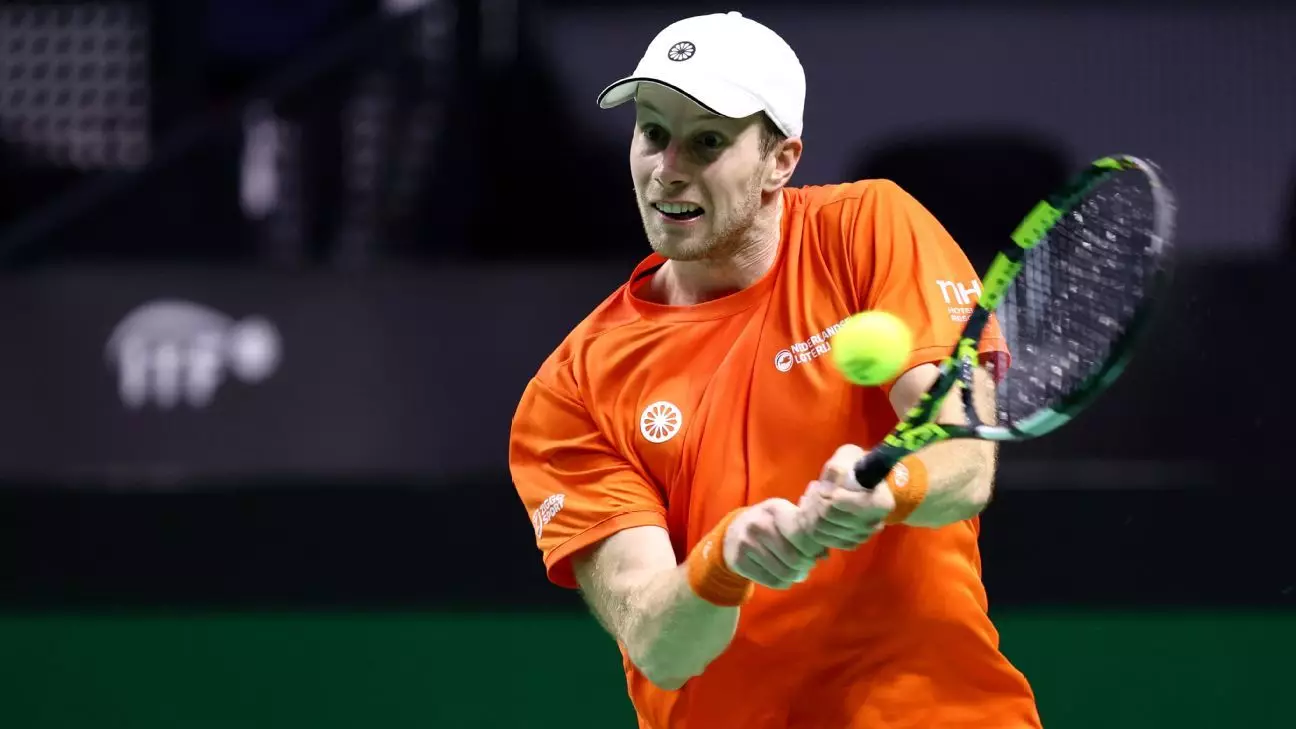In a momentous occasion for Dutch tennis, the Netherlands has reached the finals of the Davis Cup for the first time. The nation celebrated this achievement with a stunning 2-0 victory over Germany in a best-of-three semifinal match held in Malaga, Spain. Botic van de Zandschulp, ranked 80th globally, was pivotal in this success, having previously triumphed over tennis legend Rafael Nadal earlier in the tournament. Van de Zandschulp’s final match against Daniel Altmaier was a rollercoaster of emotions, culminating in a hard-fought 6-4, 6-7 (12), 6-3 victory, marking the closing chapter of a dramatic semifinal.
Tallon Griekspoor capped the Dutch festivities by defeating Jan-Lennard Struff, ensuring sequential wins that propelled the Netherlands into the finals. His remarkable performance included serving an astounding 25 aces, demonstrating a robust and resilient style of play which eventually led to a 6-7 (4), 7-5, 6-4 victory. The culmination of the match saw Griekspoor drop to his knees in jubilation, arms outstretched, embodying the euphoria of a long-awaited success for the Dutch team.
Despite the absence of top-tier players generally seen in championship teams, such as a top-five, top-ten, or even a top-fifteen ranked athlete, Dutch captain Paul Haarhuis highlighted the collective effort that carried the team to this historic win. “It’s a team effort,” he stated, beaming with pride in his players. His comments underscore a crucial attribute of the Dutch team: unity. It reflects a paradigm shift in tennis, where collective determination and teamwork can thrive, even in the absence of a superstar player.
Haarhuis’s faith in the capabilities of his team bore fruit after years of nurturing the potential within his players. The sentiment echoed by the players themselves reinforced the honesty of their commitment: “We believed in ourselves so much. We always felt like this was possible.” Such belief is fundamental in competitive sports, where the indomitable spirit often eclipses individual talent.
The match unfolded against a somewhat muted backdrop in the Palacio de Deportes Jose Maria Martinez Carpena. Following the earlier excitement of Nadal’s participation, a quieter ambiance accompanied the ensuing matches. It is vital to note that many seats remained unoccupied because of pre-purchased tickets intended for fans expecting to see Nadal in action. Yet, as Van de Zandschulp faced Altmaier, the few scattered shouts of “Vamos, Rafa!” skirted around the arena, adding a quirky layer to an otherwise solemn environment.
Van de Zandschulp’s match was precarious, as he nearly succumbed under pressure from a more aggressive Altmaier. The German showcased determination, saving five match points before persistently battling his way back into the contest. However, Van de Zandschulp demonstrated remarkable composure by sealing the match with his servitude.
Likewise, Griekspoor’s pattern mirrored a study in patience. Taking over 75 minutes to unravel the challenge posed by Struff might have induced frustration in certain athletes, yet he remained steady, breaking Struff’s serve at crucial junctures to enable his team’s unwavering momentum.
This triumph for the Netherlands should not merely be viewed in isolation, but rather as a potential harbinger of change in international tennis dynamics. The Netherlands, having not reached the semifinals since 2001, showcased that success is carved through dedication—an imperative lesson for aspiring teams globally.
In contrast, Germany seemed to linger in the shadows of its storied history, bearing the weight of previous accolades, including three Davis Cup titles, which they clinched most recently in 1993. The absence of key players like Alexander Zverev may have contributed to their downfall, but it also emphasizes the importance of nurturing emerging talents capable of stepping into the limelight when required.
As the stage is now set for the finals, all eyes will be on the Dutch team as they aim to capitalize on their hard-earned success and potentially turn this Davis Cup experience into a springboard for future triumphs on the world stage. Only time will tell what legacies will be written in the annals of this evolving narrative.

